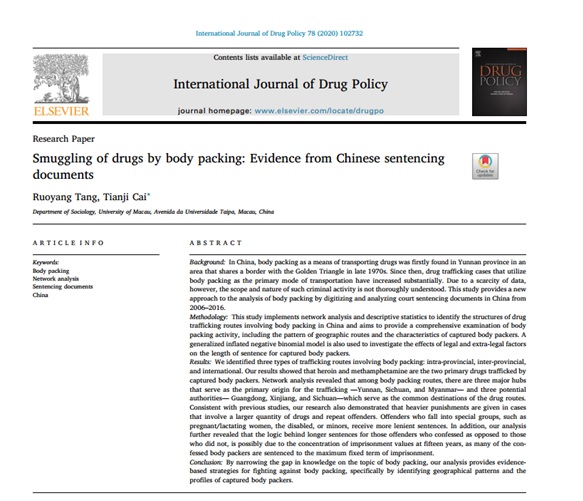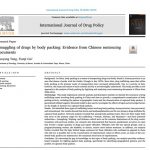 A student-faculty co-authored article has been published in a top international journal.
A student-faculty co-authored article has been published in a top international journal.
A research article titled ‘Smuggling of Drugs by Body Packing: Evidence from Chinese Sentencing Documents’, co-authored by Tang Ruoyang, a PhD candidate in the Department of Sociology, University of Macau (UM), and her supervisor, Cai Tianji, an associate professor in the same department, has been published in International Journal of Drug Policy, a leading journal in the field of substance abuse.
Established in 1987, International Journal of Drug Policy publishes articles on the social, political, legal, and health aspects of psychoactive substance use, both licit and illicit. The journal places an emphasis on the exploration of the effects of drug policy and practices on drug-using behaviour as well as its health and social consequences. Ranked third in the substance abuse category of Social Sciences Citation Index (SSCI), with an impact factor of 4.528 (2018), the journal has a significant influence in the field.
The article studies the practice of body packing in mainland China and the sentence for it. By digitising and analysing court sentencing documents in China from 2006 to 2016, the authors examined body-packing activity, including the pattern of geographic routes and the characteristics of captured body packers in China. Their results have shown that heroin and methamphetamine are the two primary drugs trafficked by captured body packers. Network analysis has revealed that among body packing routes, there are three major hubs that serve as the primary origin for drug trafficking —Yunnan, Sichuan, and Myanmar— and three potential authorities— Guangdong, Xinjiang, and Sichuan—which serve as the common destinations of the drug routes.
The study uses a generalised inflated negative binomial model to investigate the effects of legal and extra-legal factors on the length of sentence for captured body packers. Consistent with previous studies, this study demonstrates that heavier punishments are given in cases that involve a larger quantity of drugs and repeat offenders. Offenders who fall into special groups, such as pregnant/lactating women, people with disabilities, or minors, tend to receive more lenient sentences. However, according to the study, contrary to popular belief, offenders who confess to their crimes are given longer periods of imprisonment. Further analysis has revealed that the logic behind longer sentences for those offenders who confess as opposed to those who do not, is possibly due to the concentration of imprisonment values at fifteen years, as many of the body packers who confess are sentenced to the maximum fixed term of imprisonment.
This article is one of the outcomes of a research project led by Prof Cai on the analysis of Chinese sentencing documents. The research team has completed a series of studies, which has led to the publication of nine research articles in core journals.
Doctoral education in the Department of Sociology has made great progress in recent years. Papers co-authored by students and their supervisors have appeared in top journals, such as China Quarterly, Journal of Quantitative Criminology, and British Journal of Criminology.


